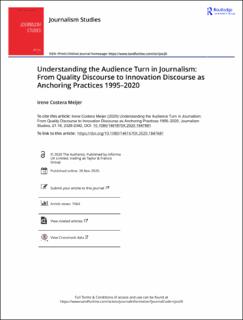Understanding the Audience Turn in Journalism: From Quality Discourse to Innovation Discourse as Anchoring Practices 1995–2020
Journal article, Peer reviewed
Published version

Åpne
Permanent lenke
https://hdl.handle.net/11250/2760565Utgivelsesdato
2020Metadata
Vis full innførselSamlinger
Sammendrag
Paying close attention to news users has become fully integrated in professional journalism. Even though this practice may still meet with resistance, becoming more audience responsive is no longer automatically condemned as the highway to popularization and sensationalism. What has changed in journalism’s ecosystem to account for this turnaround? This paper explains how journalists' attitude towards audiences changed from keeping them at a distance to constantly monitoring their movements. It is based on longitudinal participatory observation of key moments (editorial meetings, public debates) in Dutch journalism, as well as on informal talks and formal interviews with more than one hundred journalists and editors during the last twenty years. It traces four tipping points between 1995 and 2020 regarding the audience turn in commercial news and public service journalism: (1) Quality news as “not having to reckon with your audience”. (2) Increasing professional awareness of “informed citizenship” as quality journalism’s remit; (3) digitalization of journalism; and (4) increasing relevance of “audience engagement”. Ann Swidler’s concept of “anchoring practice” (2001) will be used as a lens to understand the gradual shift from quality discourse to innovation discourse as anchoring practices in journalism and journalism studies.
